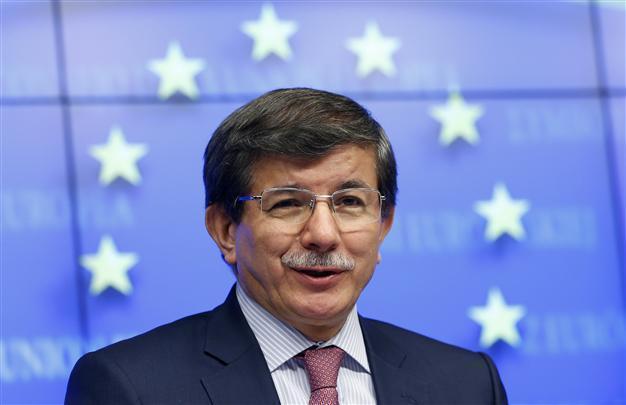EU summit to decide Turkey’s chapter fate
ANKARA

Foreign Minister Ahmet Davutoglu addresses a news conference during a European Union-Turkey association council in Brussels on May 27. A senior Turkish government official has expressed Ankara’s hope that 'common sense will prevail' to prevent the situation from becoming a deeper problem. REUTERS/Francois Lenoir
With all eyes turned to Luxembourg, where EU ministers will discuss the opening of a new negotiation chapter with Turkey, a senior Turkish government official has expressed Ankara’s hope that “common sense will prevail” to prevent the situation from becoming a deeper problem.The Foreign Affairs Council of the EU will convene today at the level of foreign ministers, under the leadership of High Representative of the Union for Foreign Affairs and Security Policy Catherine Ashton, in a highly critical meeting where a decision to open the chapter on regional policies will be discussed.
Despite the approval of 26 member countries, Germany stands as the only country that seems opposed to the opening of this chapter due to the ongoing spat between Berlin and Ankara over the Gezi Park protests. If opened, the chapter on regional policies will be the first in three years and could have a positive effect in reviving the negotiation process.
“We can’t say anything about whether Germany will lift its veto on the chapter,” a Turkish diplomat told the Hürriyet Daily News on Sunday, a day after the two countries’ foreign ministers, Ahmet Davutoğlu and Guido Westerwelle, held a brief meeting in Doha. “We very much hope that the common sense will prevail and the chapter will be opened,” the diplomat stressed, underlining that both ministers expressed their commitment to the importance of bilateral relations on the eve of a crucial decision to be made by Merkel.
The message Westerwelle will deliver to his coalition partner is critically important but there has also been heavy diplomatic traffic within the EU countries for securing Ankara-Brussels relations. Italy, Britain, Sweden have been actively working to persuade Berlin to give its go-ahead for the opening of this chapter with some midway formulas like postponing the opening of the chapter to the Lithuanian term presidency.
“Turkey is against any such postponement,” a European diplomat told the Daily News. “In fact, they are right in their demands for the opening of this chapter.”
Ankara mulling reaction
For Ankara, the postponement or cancellation of the opening of the chapter would be interpreted as an act to suspend the negotiation process because of political rationalization over the Gezi Park protests and the Turkish government’s approach toward the demonstrators. Despite Germany’s efforts to base its veto on technical reasons, Ankara recalls a ministerial level meeting last month in which German officials expressed their approval of the opening of the chapter. Westerwelle was in fact more vocal recently in supporting Turkey’s demand to open chapters 23 and 24, judiciary and fundamental rights, and justice, freedom and security, respectively, both necessary for the acceleration of the negotiation process. A rejection of the opening of the chapter would push Turkey to take some counteractions to show its dissatisfaction with the move.
Apart from the Davutoğlu-Westerwelle meeting, the two countries’ ambassadors were summoned on Friday to express their resentment over the statements of high-level officials against each other in the course of the Gezi Park protests. EU Minister Egemen Bağış’s comparison of Merkel with former French President Nicholas Sarkozy and hints that she could lose elections in September angered Merkel, whose remarks that she was shocked by the police’s crackdown on demonstrators in Turkey had irritated Ankara.
“It seems to be more a personal issue between Merkel and Erdoğan. Otherwise, the German government did not oppose the opening of this chapter in previous meetings,” a European ambassador told the Daily News.
Statements from senior government officials regarding Merkel prove that she is not among Ankara’s preferred politicians. “Ms. Merkel is making assessments on the developments in Turkey and is expressing her concerns about them. Isn’t this interference into Turkey’s internal affairs? Isn’t it an approach casting a shadow on the neutrality of a state regarding some developments inside Turkey?” said Deputy Prime Minister Bekir Bozdağ in an interview with Kanal 7 on Sunday. “The statements issued by us are only in response to Ms. Merkel’s more than one statements.”
















